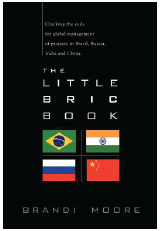By April Klimley

The Little BRIC Book: Cracking the code for global management of projects in Brazil, Russia, India and China. By Brandi Moore, (Published in 2010)
In today’s interconnected world, global teams are becoming the norm—not the exception. As Thomas Friedman pointed out in The World is Flat, technology has eliminated geographic barriers, opened up economic opportunity, and shifted power and resources. And it has also heightened the need for certain diversity skills, since today so many employees work in multicultural teams in different time zones scattered around the globe.
New markets have sprung up as a result of globalization and these are flourishing in many parts of the globe formerly considered the “Third World.” Today the fastest-growing group of these are the “BRICs”—Brazil, Russia, India, China. Just take a look at the data. Since 2009, there were more cars sold each year in China than America. Last year China and India virtually tied for first place with growth rates of over ten percent each. Retail sales in Moscow now exceed Paris and London. And in Brazil, 32 million people have moved into the “middle” and “high” income brackets. (Although South Africa was invited to join the BRICs in 2010, South Africa’s business culture differs markedly from that of the original four BRICs. South Africa also does not meet the economic selection criteria which Goldman Sachs analyst Jim O’Neill used when he came up with this acronym in 2001.)
Large U.S. corporations—the U.S. multinationals (MNCs)—are well aware of this growth, and are taking advantage of the trend—especially when it comes to fast-growing consumer markets. As Rick Newman of U.S. News and Reports observed, “Globalization has been an enormous boon for some of the biggest names in corporate America.” Just two years ago seven of the leading U.S. firms in 15 industries reported earnings of more than 50 percent from abroad: General Electric (54%), Ford (51%), IBM (64%), Intel (85%) Dow Chemical (67%), McDonald’s (66%), and Nike (50%). Another five reported earnings of 20 percent or more from outside the U.S.
This shift poses a particular challenge for U.S. multinationals, since most Americans have very little experience living or working in countries such as India or China. Of course, top executives being assigned to these countries usually receive cross-cultural training. But those left behind get very little assistance, and for the most part they are left to fend for themselves when working with BRIC teams, which may be located in several time zones and speak a variety of languages.
What the BRIC countries also have in common is a similar set of business values—very different from the way Americans do business, according to cross-cultural communications consultant Brandi Moore. For example, Americans prefer direct communications, while in the BRIC countries people are expected to be much more indirect. Organizational structures tend to be flat in the U.S., but much more hierarchical in the BRICs.
Confusion or misunderstanding about these values can shipwreck projects, making it hard for global teams to create the right new products or engage in successful launches in the BRIC country. Preconceptions of management stand in the way—both in the U.S. and the BRIC countries—in corporate corridors and academia. As Elliott Masie points out in an article on China in Chief Learning Officer, “The skills for managing a team scattered around the world—in multiple time zones and speaking multiple languages—are not routinely taught in Chinese MBA programs.”
Fortunately, a few consultants such as Moore have started studying these major differences and writing about them. Moore’s The Little BRIC Book provides glimpses into the business customs and way of thinking in the BRIC countries, while giving readers the kind of practical advice Americans need to function as effective members or leaders of these global teams.
What makes this book so valuable is the unique framework the author has created. Instead of talking in generalities, Moore provides specific descriptions of the major areas of differences—and then explains how, by modifying behavior, American team members or leaders can overcome these obstacles to arrive at the hoped-for bottom-line success. Moore has even given these U.S.-based BRIC team executives a special sobriquet—desk diplomats—a term which describes exactly what she hopes to achieve—greater cooperation and achievement between American and BRIC workers.
April W. Klimley is an award-winning business writer, editor, and magazine content consultant and manager, who has lived and worked abroad—first in Italy on a Fulbright Fellowship and then in Hong Kong as a foreign correspondent.






